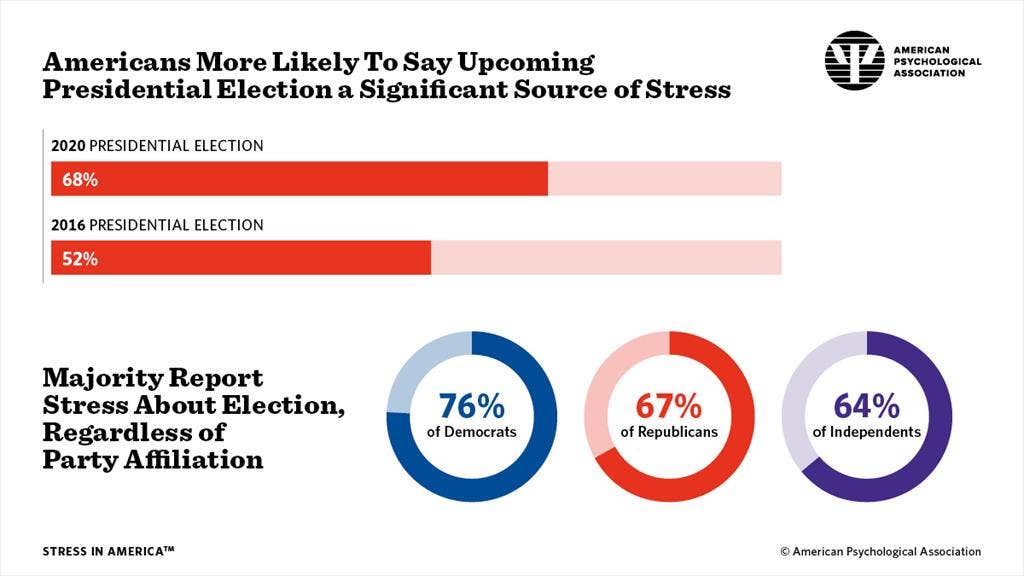Majority Of USA Suffering From Election Stress Disorder, Says Survey
New survey finds that as many as 68% of Americans are reeling from the stress. Here's how to deal.
 Evan El Amin (Shutterstock) / Getty Images
Evan El Amin (Shutterstock) / Getty Images Are you feeling a bit anxious lately? It might be election stress disorder.
When you turn on the news, and it’s all election coverage, do you start to fear for your future? Don’t worry — you're not alone.
A new survey conducted by The Harris Poll on behalf of the American Psychological Association found that 68% of Americans reported feeling election stress over this very contentious election race — up from 52% in 2016.
“This has been a year unlike any other in living memory,” APA’s chief executive officer Arthur C. Evans Jr., Ph.D. explained. “Not only are we in the midst of a global pandemic that has killed more than 200,000 Americans, but we are also facing increasing division and hostility in the presidential election."
As we unfortunately know, 2020 has brought with it not only a heavily divisive election but also growing racial tension.
The survey found that 71% of Black Americans report the election as a source of stress, up from 46% in 2016.
"The result is an accumulation of stressors that are taking a physical and emotional toll on Americans," Evans Jr. said.
While Donald Trump’s sexual assault allegations and Hillary Clinton’s emails were the focal points of the 2016 U.S. presidential election, the scandals haven't slowed down.
Since his election, Trump has been embroiled in controversy after controversy, including (but unfortunately not limited to) an impeachment and a concerning alleged connection to white supremacist groups.
According to the APA, Trump's polarizing presidency has deeply affected those who identify as Democrats, with 71% reporting significant election stress compared to 67% of Republicans.
 Photo: American Psychological Association (2020)
Photo: American Psychological Association (2020)
Of course, it's not just Trump who's stirred up controversy. This year, his Democratic opponent Joe Biden has also been accused of sexual assault, shady ties to Ukraine, and having dementia.
“We’re seeing that it doesn’t matter whether you’re registered as a Democrat or Republican — U.S. adults say they are experiencing significant stress from the current election," Lynn Bufka, PhD, Associate Executive Director for Practice Research and Policy for American Psychological Association, explained in 2016. " Stress becomes exacerbated by arguments, stories, images, and video on social media that can heighten concern and frustration, particularly with thousands of comments that can range from factual to hostile or even inflammatory.”
It's been shown that election stress spans across all ages; it’s not just the younger generation consumed by media that’s feeling the weight of this election.
 Photo: APA (2016)
Photo: APA (2016)
Whoa! Maybe we should all be stepping away from the TV and social media for a bit. It can most certainly be overwhelming when it’s all we hear and see and talk about.
There are some things you can do to help yourself, though.
How to cope with election stress disorder
The APA has offered some tips to help you cope with election stress disorder.
1. Minimize your time on social media.
Seriously, the baby pictures and the new kale chip recipe your friend just tried will be there later. Stay present in your own life and don’t get caught up in the 24/7 news cycle that’s bound to appear in your news feed.
2. Volunteer.
Do you feel really strongly about an issue or cause? Change the negative energy into a positive activity. Volunteering is ALWAYS satisfying and you’re helping others, regardless of what you choose to do.
3. Connect with friends and family IRL.
Times are a little tough right now when it comes to socializing thanks to social distancing regulations. However, if you're able to get out for a walk with a roommate or family member or video chat with some friends, the APA states that research shows that extra emotional support makes it easier to cope.
4. Go out and vote.
Yes, your vote matters. So make sure you get out there and make a difference!
Most of all, rest assured that your stress is normal and you are so not alone.
Liza Walter is a writer who focuses on current events, pop culture, and true crime. You can follow her on Twitter.

